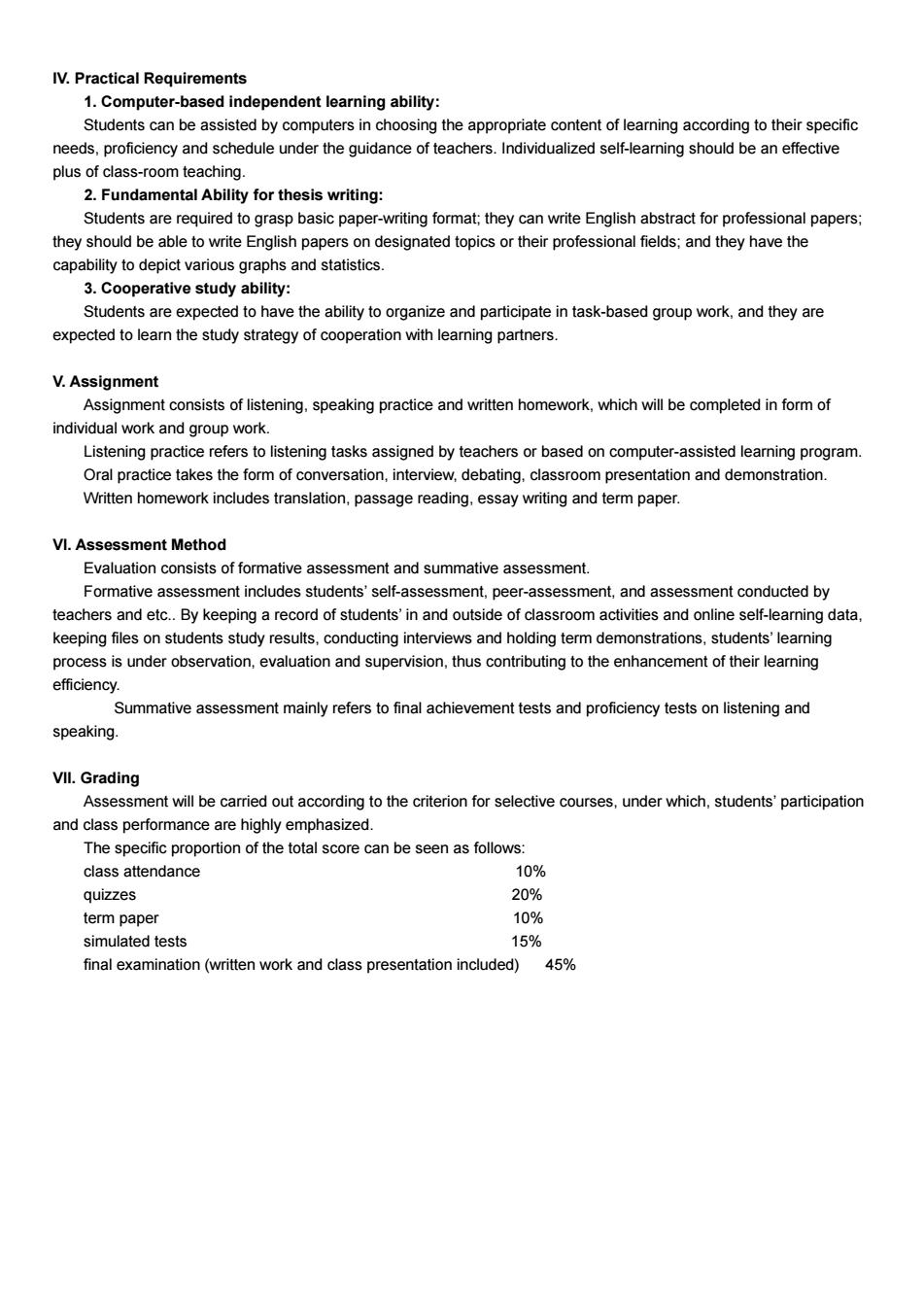正在加载图片...

IV.Practical Requirements 1.Computer-based independent learning ability: Students can be assisted by computers in choosing the appropriate content of learning according to their specific needs,proficiency and schedule under the guidance of teachers.Individualized self-learning should be an effective plus of class-room teaching. 2.Fundamental Ability for thesis writing: Students are required to grasp basic paper-writing format;they can write English abstract for professional papers; they should be able to write English papers on designated topics or their professional fields;and they have the capability to depict various graphs and statistics. 3.Cooperative study ability: Students are expected to have the ability to organize and participate in task-based group work,and they are expected to learn the study strategy of cooperation with learning partners. V.Assignment Assignment consists of listening,speaking practice and written homework,which will be completed in form of individual work and group work. Listening practice refers to listening tasks assigned by teachers or based on computer-assisted learning program. Oral practice takes the form of conversation,interview,debating,classroom presentation and demonstration. Written homework includes translation,passage reading,essay writing and term paper. VI.Assessment Method Evaluation consists of formative assessment and summative assessment. Formative assessment includes students'self-assessment,peer-assessment,and assessment conducted by teachers and etc..By keeping a record of students'in and outside of classroom activities and online self-learning data. keeping files on students study results,conducting interviews and holding term demonstrations,students'learning process is under observation,evaluation and supervision,thus contributing to the enhancement of their learning efficiency. Summative assessment mainly refers to final achievement tests and proficiency tests on listening and speaking. VIl.Grading Assessment will be carried out according to the criterion for selective courses,under which,students'participation and class performance are highly emphasized. The specific proportion of the total score can be seen as follows: class attendance 10% quizzes 20% term paper 10% simulated tests 15% final examination(written work and class presentation included) 45%IV. Practical Requirements 1. Computer-based independent learning ability: Students can be assisted by computers in choosing the appropriate content of learning according to their specific needs, proficiency and schedule under the guidance of teachers. Individualized self-learning should be an effective plus of class-room teaching. 2. Fundamental Ability for thesis writing: Students are required to grasp basic paper-writing format; they can write English abstract for professional papers; they should be able to write English papers on designated topics or their professional fields; and they have the capability to depict various graphs and statistics. 3. Cooperative study ability: Students are expected to have the ability to organize and participate in task-based group work, and they are expected to learn the study strategy of cooperation with learning partners. V. Assignment Assignment consists of listening, speaking practice and written homework, which will be completed in form of individual work and group work. Listening practice refers to listening tasks assigned by teachers or based on computer-assisted learning program. Oral practice takes the form of conversation, interview, debating, classroom presentation and demonstration. Written homework includes translation, passage reading, essay writing and term paper. VI. Assessment Method Evaluation consists of formative assessment and summative assessment. Formative assessment includes students’ self-assessment, peer-assessment, and assessment conducted by teachers and etc.. By keeping a record of students’ in and outside of classroom activities and online self-learning data, keeping files on students study results, conducting interviews and holding term demonstrations, students’ learning process is under observation, evaluation and supervision, thus contributing to the enhancement of their learning efficiency. Summative assessment mainly refers to final achievement tests and proficiency tests on listening and speaking. VII. Grading Assessment will be carried out according to the criterion for selective courses, under which, students’ participation and class performance are highly emphasized. The specific proportion of the total score can be seen as follows: class attendance 10% quizzes 20% term paper 10% simulated tests 15% final examination (written work and class presentation included) 45%